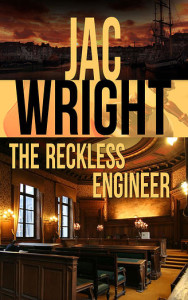 THE RECKLESS ENGINEER by Jac Wright
THE RECKLESS ENGINEER by Jac Wright
Love is a Battlefield.
The aftershocks of an affair reverberate out to those in the lives of the lovers, who will NOT take it lying down.
Jack Connor’s idyllic life in the Portsmouth countryside with his billionaire heiress wife, Caitlin McAllen, is shattered when alluring Michelle, with whom he was having an affair, is found dead and Jack is arrested for the murder. Jeremy Stone brings a top London attorney to handle his best friend’s defense.
Read more about The Reckless Engineer.
Buy: Amazon
Interview with Jac Wright
Author, Poet & Electronic Engineer
1. At what point did you decide to be an author and what was your path to publication?
I have been writing since my mother enrolled me in weekend Trinity College Speech & Drama classes when I was three years old. However, most of my writing was for lessons and exams until I started my undergraduate degree at Stanford. My high-school education had been in Science & Engineering and it was Stanford’s Liberal Arts education program and Stanford’s culture that liberated me from my limited self-image. Stanford emphasizes that one can excel equally well at several things that are considered opposites of each other; that one can be a Renaissance man. I took a lot of liberal arts courses, including creative writing, and started writing for myself and an audience while I was at Stanford.
The first works I wrote were poetry and then I progressed to short stories. I first started writing long-form fiction about 2008 with the intent of being published. I believe one needs a certain amount of life experience to write with impact and I felt I was ready about this time.
I have always preferred the traditional route. I am a classic at heart in dress, ideas, education . . . everything. I always take the classical route. I sent my poems and short stories for publication in literary magazines. Once The Reckless Engineer was ready, I went through the traditional route of posting out the first 50 pages along with SASE (self-addressed, stamped envelopes) to agents and, in turn, publishers. It wasn’t hard to get published, but the route is long and protracted. I got offers from 6 publishing houses from the first round of manuscripts I sent out, and I know I chose the best one for me, Soul Mate Publishing, New York, because of the instantaneous rapport I sensed with my editor.
2. As an engineer myself, I find your background in both engineering and literature fascinating. How much of your own experiences were you able to include in The Reckless Engineer?
A lot of my own experience in the engineering field factors into The Reckless Engineer. There hasn’t been a hero who is an engineer since Barney in the Mission Impossible series; and Q in James Bond is supporting cast. There are so many medical dramas on TV. Where are the engineering dramas? I wanted young adults to see how enjoyable, glamorous, and cool engineering is and create a hero that will attract youngsters to its various fields such as electronics, civil engineering, petroleum engineering, chemical engineering, computer science etc. As you might have noticed my series lead, Jeremy, has an educational background similar to me.
I have worked in most of the fields I write about in the book–electronics, computer science, petroleum engineering, bio-informatics etc. It was easy, for example, to use my knowledge gained from bio-engineering contracts in drug design to find out the process for synthesizing the poison.
As you know engineers are problem solvers. They are very bright, resourceful, creative, inquisitive, observant, and highly skilled. You put a problem before us and we WILL come up with a solution that will surprise everybody. These are character traits that are ideally suited to create a brilliant amateur detective.
3. Did you have to do special research for scenes in the book?
As I described above, the engineering information was second nature to me. I have two best friends, one of who is an electrical engineer like me and the other, a barrister. As you know the book is a legal thriller as well as a mystery. Hence, it is to my second best friend that I turned to for the legal information and research I needed. I accompanied him and his solicitors on many cases from arrest to appeal to capture the scenes, and turned to him for all the legal arguments used in the book.
I also knew I wanted to set the first book in Portsmouth, Hampshire, because it is the birthplace of Charles Dickens. My mother loves Charles Dickens’ work and some of my best and earliest memories are of her reading Oliver Twist and David Copperfield to me even before I could read. When I could read, some of the best books I read in childhood are Dickens’ works from the rack of books my mother had in the attic.
Therefore I moved to Portsmouth to write the book. Even after I had moved out of Portsmouth again I would check into hotels in Portsmouth for days to write some of the sceneries. I similarly volunteered to help a friend with the backstage production of a play in the London West End to create that scene set at the Gielgud Theatre.
4. Describe your writing process. Do you outline, plot and plan, or is your writing more organic?
Oh no, I cannot work to such a “surgical” process as a set plot, a plan, and a schedule. If I do, it comes out feeling contrived and I trash it.
Usually the core idea of the plot, the main characters, and the setting comes to me inextricably interwoven together in a moment of unexpected inspiration, like a disjointed dream or a segments of a movie, and then it nags at me until I put it down on paper.
For example, this June I woke up with this image of a fugitive, a man escaping from the van transporting him from prison to the courts that had had an accident and overturned by the roadside. Prisoners wear regular clothes in England and are not chained. He runs into the crowds and a bus parked behind a mall to hide among the people only to find that it is a film set. The actor playing a main character of the movie and the director are having a fight. The actor suddenly punches the director in the face who falls backward. My protagonist fugitive hiding among the supporting film crew catches him and breaks the fall. The director gets up, wipes the blood off his nose, fires the main actor loudly, and asks him to get out of his movie set. He turns to my protagonist and asks: ‘You there, what’s your name?’ ‘Art Miller,’ he gives a fake name. ‘Art, you are playing Michael Fallon. His trailer is yours now. Go with my crew and get dressed.’ And there I have the plot, the main characters, and the first chapter of my standalone, In Plain Sight.
After this initial idea comes to me, I give my characters a psychology, keep them true to it, and let them drive the story forward. I became interested in Jungian and Freudian psychology during, again, my liberal arts education at Stanford and I have studied both schools of psychology. I apply these theories and experiences to my characters.
For The Reckless Engineer the plot is a dual or the complementary plot of the idea I had for writing The Closet from my short fiction collection, Sumemrset Tales. I wrote The Closet first, looking at the troubles of a guy who is blinded by passion and romantic love from his own point of view. In that story I am right inside my protagonist’s head, telling the reader about the angst, the passion, the pain … how it feels for him.
I had for a while wanted to do its dual plot, looking at the same situation from the viewpoints of the people around my protagonist, and this is the plot I use in The Reckless Engineer. This time I hardly give my protagonist, Jack Connor, a voice at all, deliberately keeping him in custody for much of the story. I give everybody around him a voice instead.
5. What are some books or authors would you recommend to our readers?
I hero-worship Patricia Highsmith. She is one writer who does amazingly well with all four aspects of suspense writing that I value – characters, plot, literary prose, and the setting or world building – with primacy given to characters. Her POV is perfect. Her books are a master class in compelling character creation. She is, like me, firmly based in Virginia Woolf’s Bloomsbury school of writing and does almost a close psychoanalysis of her main characters.
I also like Roald Dahl for his suspense fiction. He is the master of the unexpected psychological twist in his writing in the short form. And, of course, I love Charles Dickens.
Out of the modern writers, I like Ian Rankin and Benjamin Black who both write “literary” suspense fiction with descriptive, poetic prose and good character creation. They do, however, write noir which is not really my style.
I also think Gillian Flynn is one writer to watch. The “domestic” psychological thriller sub-genre she has written Gone Girl in is right up my street.
About the Author:
Jac Wright is a published poet, published author, and an electronics engineer educated at Stanford, University College London, and Cambridge who lives and works in England. Jac studied English literature from the early age of three, developing an intense love for poetry, drama, and writing in Trinity College Speech & Drama classes taken every Saturday for fourteen years, and in subsequent creative writing classes taken during the university years. A published poet, Jac’s first passion was for literary fiction and poetry writing as well as for the dramatic arts. You will find these influences in the poetic imagery and prose, the dramatic scene setting, and the deep character creation.
These passions – for poetry, drama, literary fiction, and electronic engineering – have all been lovingly combined to create the first book in the literary suspense series, The Reckless Engineer. There are millions of professionals in high tech corporate environments who work in thousands of cities in the US, the UK, and the world such as engineers, technicians, technical managers, investment bankers, and corporate lawyers. High drama, power struggles, and human interest stories play out in the arena every day. Yet there are hardly any books that tell their stories; there are not many books that they can identify with. Jac feels compelled to tell their stories in The Reckless Engineer series.
Jac also writes the literary short fiction series, Summerset Tales, in which he explores characters struggling against their passions and social circumstances in the semi-fictional region of contemporary England called Summerset, partly the region that Thomas Hardy called Wessex. Some of the tales have an added element of suspense similar to Roald Dahl’s Tales of the Unexpected. The collection is published as individual tales in the tradition of Charles Dickens’ The Pickwick Papers and Thomas Hardy’s Wessex Tales. The first tale, The Closet, accompanies the author’s first full-length literary suspense title, The Reckless Engineer.
Twitter: @JacWrightBooks



Julie, I should like to thank you for hosting me on your fine blog. I had great fun with the interview; such insightful questions.
Thanks Kimba for the mention.
I wish the blog and its members many happy experiences through reading.
Fantastic interview, and I love how you stories begin to take shape. I really enjoyed Flynn’s novel Gone Girl as well.
kimbacaffeinate recently posted…Red Hill by Jamie McGuire